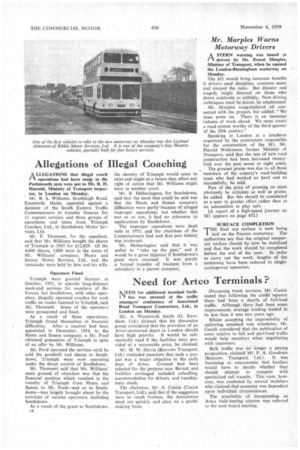Allegations of Illegal Coaching
Page 42

If you've noticed an error in this article please click here to report it so we can fix it.
ALLEGATIONS that illegal coach operations had been matte in the Portsmouth area were put to Mr. R. IL. Harrold, Ministry of Transport inspector, in London on Monday.
Mr. B. S. Williams, Southleigh Road, Emsworth, Hants, appealed against a decision of the South Eastern Traffic Commissioners to transfer licences for 11 express services and three groups of excursions and tours from Triumph Coaches, Ltd., to Southdown Motor Services, Ltd.
Mr. F. Thomsett, for the appellant, said that Mn Williams bought the shares of Triumph in 1947 for £12,829. Of the 4,000 shares, 3,000 were in the name of Mr. Williams' company, Hants and Sussex Motor Services, Ltd.. and the remainder were held by him and his wife.
Operators Fined
Triumph were granted licences in October, 1951, to operate long-distance week-end services for members of the Forces, but Southdown. with other operators, illegally operated coaches for such traffic on routes licensed to Triuniph, said Mr. Thornsett. Some of the operators were prosecuted and fined.
As a result of those operations, Triumph found themselves in financial difficulties. After a receiver had been appointed in December, 1954, to the Hants and Sussex company, a Mr. Ford obtained possession of Triumph in spite of an offer by Mr. Williams.
Mr. Ford operated the services until he sold the goodwill and shares to Southdown. Triumph were now operating under the direct control of Southdown.
Mr. Thomsett said that Mr. Williams' main ground of objection was that the financial position which resulted in the transfer of Triumph from Hants and Sussex to Mr. Ford—and so to Southdown—was largely brought about by the activities of various operators, including Southdown.
As a result of the grant to 8outhdown, c4 the identity of Triumph would cease to exist and might at a future 'date affect any right of action that Mr. Williams might have in another court.
Mr. B. Hetherington, for Southdown, said that the most that could he said was that the Hants and Sussex concern's difficulties were partly because of alleged improper operations; but whether this was so or not, it had no relevance to applications by Southdown.
The improper operations were dealt with in 1953, and the chairman of the Commissioners had said that past history was irrelevant.
Mr. Hetherington said that it was unfair to "rake up the past," arid it would be a gross injustice if Southdown's grant were reversed. It was purely a formal transfer of business from a subsidiary to a parent company.












































































































